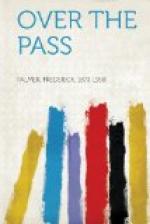“Si!” said Firio, resuming his impassiveness, and slipped around the corner of the house.
“He does care!” Jack cried with a smile, which, however, was not the smile of gardens, of running brooks, and of song. “I am glad—glad!”
He picked up his crutches and went out to the three steeds of trail memory:
“And you care—you care!” he repeated to them.
He drew a lugubrious grimace in mockery at Wrath of God. He tickled the sliver of the donkey’s ear, whereat Jag Ear wiggled the sliver in blissful unconsciousness that he had lost any of the ornamental equipment of his tribe.
“You are like most of us; we don’t see our deformities, Jag Ear,” Jack told him. “And if others were also blind to them, why, we should all be good-looking!”
His arm slipped around P.D.’s neck and he ran a finger up and down P.D.’s nose with a tickling caress.
“You old plodder!” he said. “You know a lot. It’s good to have the love of any living thing that has been near me as long as you have.”
This preposterous being was preposterously sentimental over a pair of ponies and an earless donkey. When Mrs. Galway, who had watched him from the window, came out on the porch she saw that he was on his way through the gate in the hedge to the street.
“Look here! Did the doctor say you might?” she called.
“No, my leg says it!” Jack answered, gaily. “Just a little walk! Back soon.”
It was his first enterprise in locomotion outside the limits of Jim Galway’s yard since he had been wounded. He turned blissful traveller again. Having come to know the faces of the citizens, now he was to look into the faces of their habitations. The broad main street, with its rows of trees, narrowed with perspective until it became a gray spot of desert sand. Under the trees leisurely flowed those arteries of ranch and garden-life, the irrigation ditches. Continuity of line in the hedge-fences was evidently a municipal requirement; but over the hedges individualism expressed itself freely, yet with a harmony which had been set by public fashion.
The houses were of cement in simple design. They had no architectural message except that of a background for ornamentation by the genius of the soil’s productivity. They waited on vines to cover their sides and trees to cast shade across their doorways. One need not remain long to know the old families in this community, where the criterion of local aristocracy was the size of your plums or the number of crops of alfalfa you could grow in a year.
Already Jack felt at home. It was as if he were friends with a whole world, lacking the social distinctions which only begin when someone acquires sufficient worldly possessions to give exclusive, formal dinners. He knew every passer-by well enough to address him or her by the Christian name. Women called to him from porches with a dozen invitations to visit gardens.




